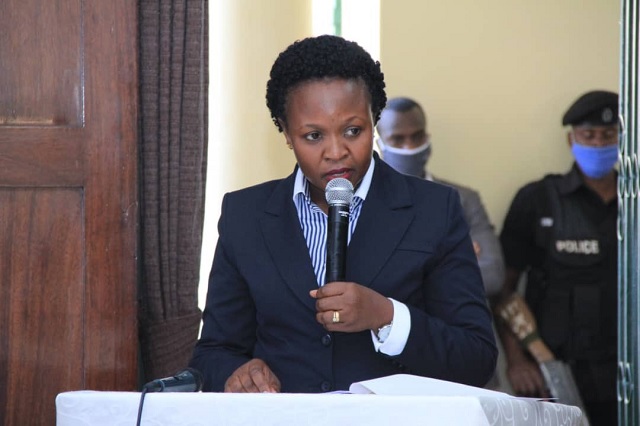
Kampala, Uganda | THE INDEPENDENT | The Judiciary has ordered all Chief Magistrates to set aside all their routine work and prioritize the swearing in of incoming district executive committees.
Regulation 2 of the 3rd schedule and 8th schedule of the Local Government requires all elected local councils to take oaths of allegiance of the office they are elected to serve in before assuming office.
Section 11 (8) of the Local Government Act further mandates chief magistrates to preside over the election of the speaker of the district speaker.
In a circular issued by Judiciary on Friday May 14th 2021, the Chief Registrar Sarah Langa Siu has directed all Chief Magistrates to set aside all their routine work and prioritize the swearing in of incoming district executive committees.
Langa has also advised Chief Administrative Officers and the Clerks to District Councils to liaise with the Chief Magistrates in their areas to draw clear programmes for smooth swearing in ceremonies of the office bearers.
Langa reminded the Chief Magistrates that swearing in of incoming district executive committees must be conducted within seven days from May 12th 2021 in accordance with section 169 of the Local Government Act and ensure its completed by 19th May 2021.
The statement indicates that the judiciary has only 58 Chief Magistrates to perform the functions in all 146 districts of Uganda which means some will handle more than four districts.
Alex Felix Majeme, the Nakasongola District Chief Administrative Officer says that he has already liaised with the Chief Magistrate and fixed 18th May 2021 to swear in the incoming executive.
In Luwero, Erastus Kibirango, the elected LC 5 chairman says that the CAO had written to Chief Magistrate Elizabeth Namanda to preside over the swearing in on 25th May this year but with the circular as issued by the Judiciary, he may advise for another day that falls within the stipulated seven days.
In Nakaseke, the swearing of the incoming district executive is scheduled on 21st May next week which is also past the dates it can lawfully take place.
Last week, the Solicitor General advised the Ministry of Local Government to adjust the dates for the swearing-in of newly elected local government leaders.
The letter dated May 11th 2021, signed by Paul Okirig on behalf of Solicitor General Francis Atoke said that if the swearing-in takes place more than seven days after May 12th, it will be in contravention of section 169 of the Local Government Act.
He added: “We undertake to inform the Ministry of Local Government to review the advice taking this into consideration.”
This was after Busia district chairperson elect Stephen Wasike Mugeni petitioned the office of the Solicitor General on May 5th 2021 asking for the legal opinion and interpretation of the law about handing over of office and coming in of new local government leaders.
According to Wasike’s letter, the taking over of office and formal handing over of office from the outgoing executive committee to the incoming executive committee particularly for Busia was fixed for May 25th 2021, which is more than a week after the expiry of the term of the previous executive committee.
Initially, the Permanent Secretary of Local Government Ministry Ben Kumumanya had also written ordering all Chief Administrative Officers and Town Clerks to arrange for swearing-in activities between 13th and 28th May 2021 to enable a smooth transition between the outgoing and the new Local Government council.
When contacted the Judiciary Spokesperson Solomon Muyita as to whether their statement cancels the earlier swearing in arrangements made by the Local Government Ministry, he said the arrangement was probably made without looking at the law which should have guided them.
URN also contacted the Minister for Local Government Raphael Magyezi on when exactly the swearing in will take place following the Judiciary statement and he said he was attending a meeting also aiming to clarify on the matter.
The newly elected local government leaders went to the polls in late January 2021 shortly after the presidential and parliamentary elections which attracted thousands of contestants in general.
*****
URN
 The Independent Uganda: You get the Truth we Pay the Price
The Independent Uganda: You get the Truth we Pay the Price



